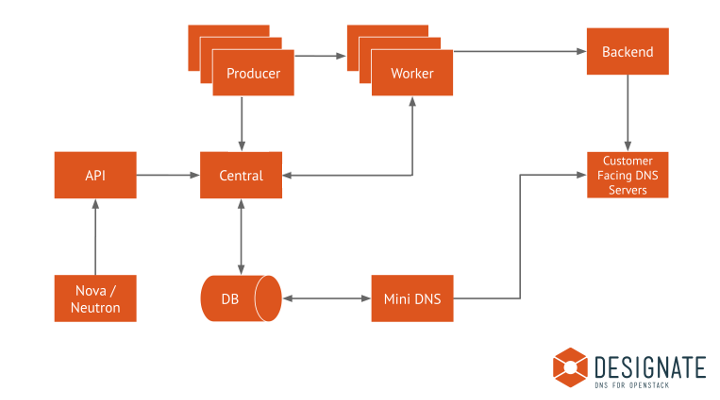Change-Id: I797d2445b16c8348cdbafbb4f859251c772e1e14 Signed-off-by: Doug Hellmann <doug@doughellmann.com>
5.4 KiB
Architecture
Designate provides multi-tenant DNS as a Service. Designate provides a REST API, applies business logic, persists DNS data to a database, and orchestrates the propagation of the DNS data to configured pools of DNS servers. For a more detailed breakdown of responsibilities and components, see the components below.
double: architecture; brief
High Level Topology
Designate API
designate-api provides the standard OpenStack style REST API service,
accepting HTTP requests, validating authentication tokens with Keystone
and passing them to the designate-central service over AMQP. Multiple versions
of the API can be hosted, as well as API extensions, allowing for
pluggable extensions to the core API.
Although designate-api is capable of handling HTTPS traffic, it's typical to terminate HTTPS elsewhere, for example by placing nginx in front of designate-api or by letting the external facing load balancers terminate HTTPS.
Designate Central
designate-central is the service that handles RPC requests via the MQ, it coordinates the persistent storage of data and applies business logic to data from the API. Storage is provided via plugins, typically SQLAlchemy, although MongoDB or other storage drivers should be possible.
Designate MiniDNS
designate-mdns is the service that sends DNS NOTIFY and answers zone transfer (AXFR) requests. This allows Designate to integrate with any DNS server that supports these very standard methods of communicating. designate-mdns also encapsulates all other forms of DNS protocol that Designate performs. For example, sending SOA queries to check that a change is live.
Designate Worker
designate-worker is a service that manages state of the DNS servers Designate manages, and any other long-running or otherwise complicated piece of work. The worker reads configuration for DNS servers from the Designate database, which is populated via the pools.yaml file. These DNS server backends are loaded into the worker so it understands how to create, update, and delete zones and recordsets on each DNS server. The Worker is fully aware of DNS Server 'Pools', so a single worker process can manage many pools of DNS servers.
Designate Producer
designate-producer is a service that handles the invocation of long-running and potentially large jobs. Producer processes start work for an automatically assigned shard of the zones Designate manages. Shards are allocated based on the first three characters of the zone ID (a UUID field). The number of shards under management of a single producer process is equal to the total number of shards divided by the number of producer processes. This means the more producer processes are started, the less work is created at any one time.
The current implemented tasks in producer include emitting dns.zone.exists events for Ceilometer, purging deleted zones from database, polling secondary zones at their refresh intervals, generating delayed NOTIFY transactions, and invoking a periodic recovery of zones in an error state.
Designate Sink
designate-sink is an optional service which listens for event notifications, such as
compute.instance.create.end, handlers are available for Nova and
Neutron. Notification events can then be used to trigger record creation
& deletion.
The current sink implementations generate simple forward lookup A records, using a format specified in handler-nova configuration. Any field in the event notification can be used to generate a record.
DNS Backend
Backends are drivers for a particular DNS server. Designate supports multiple backend implementations, PowerDNS, BIND, NSD, DynECT, you are also free to implement your own backend to fit your needs, as well as extensions to provide extra functionality to complement existing backends.
Message Queue
Designate uses oslo.rpc for messaging between components, therefore it inherits a requirement for a supported messaging bus (such as RabbitMQ, Qpid or ZeroMQ). Typically this means a RabbitMQ setup is dedicated to Designate, but as only a single virtualhost is required for a normal installation, you’re free to use other RabbitMQ instances as you see fit.
Database/Storage
Storage drivers are drivers for a particular SQL/NoSQL server. Designate needs a SQLAlchemy-supported storage engine for the persistent storage of data. The recommended driver is MySQL.
